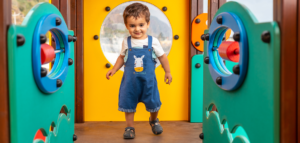
The Importance of Play-Based Learning in Early Childhood
In the early years of a child’s life, learning happens at an extraordinary pace. During this time, it is crucial to create an environment that nurtures curiosity, creativity, and the overall development of young minds. One of the most effective approaches to early childhood education is play-based learning. It allows children to explore and learn through activities that they naturally enjoy—playing. At Learning Twist, we firmly believe in the power of play-based learning, and here’s why it is so important.
1. Play Encourages Cognitive Development
Play is more than just fun—it’s a key driver of cognitive development. When children engage in activities like puzzles, building blocks, and role-playing, they are learning to solve problems, understand cause-and-effect relationships, and think critically. Play stimulates brain development by allowing children to experiment, explore, and discover new concepts on their own, which helps solidify knowledge and enhance their intellectual growth.
2. Play Enhances Social Skills
Play-based learning often involves group activities, whether it’s playing pretend or working together to build something. These interactions are essential for developing social skills, such as communication, teamwork, and empathy. Children learn how to share, negotiate, and resolve conflicts while playing with their peers, helping them build relationships and navigate social environments confidently.
3. Play Fosters Creativity and Imagination
One of the most beautiful aspects of play is the way it nurtures creativity and imagination. Whether they’re pretending to be astronauts on a space mission or building castles out of blocks, children use their imaginations to create whole worlds. This type of imaginative play encourages them to think outside the box, explore new ideas, and express themselves freely, laying the foundation for innovative thinking later in life.
4. Play Promotes Emotional Development
Play gives children the space to explore their emotions in a safe environment. Through pretend play and storytelling, children can express their feelings, experiment with different roles, and understand emotions like joy, fear, and frustration. This helps them build emotional resilience, develop empathy for others, and learn to manage their emotions effectively.
5. Play Supports Physical Development
Physical play, such as running, jumping, climbing, and even fine motor activities like painting or threading beads, helps children develop essential motor skills. Gross motor skills are enhanced through outdoor play, while fine motor skills are developed through activities like drawing, cutting, and building with small objects. Play helps children improve their coordination, balance, and overall physical strength, contributing to their health and well-being.
6. Play Cultivates a Love for Learning
By making learning fun, play-based activities cultivate a lifelong love for learning. When children enjoy the process of discovery, they become more motivated to explore new topics and develop a positive attitude toward education. This early enthusiasm for learning sets the stage for future academic success.
7. Play-Based Learning Meets Developmental Needs
Play-based learning is developmentally appropriate, allowing children to progress at their own pace. It takes into account that young children learn best through hands-on experiences and active exploration. Unlike rigid, formal instruction, play-based learning allows children to engage with concepts in ways that make sense to them, providing opportunities to revisit and reinforce learning as needed.
Conclusion
At Learning Twist, we incorporate play-based learning into our daily curriculum because we understand its immense benefits for early childhood development. Through play, children not only gain academic knowledge but also develop the social, emotional, and physical skills needed for life. It’s not just about teaching; it’s about allowing children to learn, grow, and thrive in an environment that respects their natural curiosity and love for play.
If you want your child to experience the joy and benefits of play-based learning, join us at Learning Twist—where education and fun go hand-in-hand!
About Author

Reena Tomar (Principal)
Reena Tomar is a dedicated and passionate educator at Learning Twist Pre-School, where she plays a vital role in shaping the minds of young learners. With a background in early childhood education and several years of experience, Reena is committed to creating a nurturing and stimulating environment for her students. Her approach to teaching is centered around play-based learning, encouraging children to explore their creativity, develop critical thinking skills, and build social connections through fun and engaging activities. Reena believes in the power of hands-on learning and strives to make every day at Learning Twist an exciting adventure for the children. Known for her warm personality and patience, Reena Tomar is adored by both her students and their parents. Her ability to connect with children on a personal level and foster a love for learning makes her a cherished member of the Learning Twist team. With her guidance, children not only gain essential academic skills but also grow in confidence, empathy, and independence.
Recent posts


5 Essential Skills Your Child Will Learn in Preschool

10 Fun Art and Craft Ideas to Try at Home with Your Preschooler


